
In today’s rapidly evolving business landscape, technological innovations have changed how big and small companies engage with their customers. One such innovation is integrating an Artificial Intelligence (AI) chatbot.
Picture a scenario where customers can interact with a brand anytime, anywhere, and receive prompt, personalized personalized responses without human intervention. This is the power of AI chatbots.
These digital conversationalists have become the bridge between businesses and their target audience, seamlessly offering assistance, answering queries, and even completing transactions.
As we navigate through the intricate realm of AI chatbots, the purpose of this article becomes clear: to offer a comprehensive insight into the best AI chatbot available.
By the end of this article, you will understand the significance of AI chatbot technology and be equipped with the insights needed to harness their full potential to assist customers in enhancing customer experiences and driving business efficiency.
Table of Contents
What is an AI Chatbot?
In modern technology, AI chatbots are prime examples of how artificial intelligence seamlessly integrates into everyday business operations.
At its core, an AI chatbot is a computer program designed to simulate human conversation. It harnesses the power of natural language processing (NLP) to understand user queries, interpret their intent, and deliver relevant responses.
Operating across various digital platforms – websites, social media, messaging apps – AI chatbots are designed to streamline interactions by providing instant and accurate information.
The intricate workings of AI chatbots involve pattern recognition, data analysis, and real-time learning. These digital agents continually improve their responses by analyzing vast data – from past conversations to current trends – to deliver tailored and contextually relevant replies. This ability to comprehend context and sentiment ensures that user interactions are efficient and remarkably human-like.
Use Cases for AI Chatbots
The versatility of AI chatbots extends far beyond mere customer service. These digital envoys have infiltrated diverse industries, proving their mettle in various roles, from providing instant support to revolutionizing sales and marketing strategies.
Real-Life Use Case: AI Chatbots Enhancing Tech Support at TechConnect Corp
TechConnect Corp, a leading tech solutions provider, faced a growing challenge in providing efficient technical support for its diverse clientele, ranging from small businesses to large enterprises. The company leveraged AI chatbots to streamline its tech support processes and enhance customer satisfaction.
The Problem:
TechConnect Corp had an extensive client base with varying technical needs and support requirements. Traditional tech support methods became increasingly overwhelming, leading to longer resolution times, frustrated clients, and rising support costs.
The AI Chatbot Solution:
TechConnect Corp implemented an AI-powered chatbot named “TechBot” to revolutionize its technical support operations.
Key Features and Functionality:
- 24/7 Availability: TechBot operates 24/7, providing round-the-clock assistance to clients, regardless of their time zones.
- Instant Troubleshooting: Using AI algorithms, it can diagnose common technical issues and offer step-by-step solutions in real-time.
- Knowledge Base Integration: TechBot is integrated with the company’s extensive knowledge base, enabling it to provide detailed answers to complex technical queries.
- User-Friendly Interface: The chatbot boasts a user-friendly interface, making it accessible to tech-savvy and non-tech-savvy clients.
- Scalable Support: TechBot can simultaneously handle multiple support inquiries, ensuring no client is left waiting for assistance.
- Seamless Escalation: When an issue surpasses the chatbot’s capabilities, it seamlessly transfers the conversation to a human tech support specialist, preserving the chat history.
Results and Benefits:
- Faster Issue Resolution: TechBot’s instant troubleshooting capabilities have significantly reduced the time it takes to resolve technical issues, leading to happier and more satisfied clients.
- Cost-Efficiency: The implementation of TechBot has allowed TechConnect Corp to optimize its tech support operations and reduce costs associated with a large support team.
- Improved Customer Experience: Clients appreciate the immediate support and seamless experience provided by TechBot, enhancing their overall satisfaction.
- Increased Client Base: The efficient and accessible tech support has attracted new clients, expanding TechConnect Corp’s customer base.
This real-life use case illustrates how TechConnect Corp has successfully incorporated AI chatbots like TechBot to revolutionize its tech support services, improving efficiency, cost savings, and enhancing customer experiences.
Industries Benefiting from AI Chatbot Integration
- Retail: E-commerce platforms employ AI chatbots to offer personalized product recommendations, answer customer queries, and guide users through purchasing.
- Finance: In banking and financial services, AI chatbots provide balance inquiries, transaction history, and investment advice, enhancing customer engagement.
- Healthcare: AI chatbots offer symptom analysis, appointment scheduling, and medication reminders and can connect users to medical professionals.
- Hospitality: In the hospitality sector, AI chatbots manage reservations, handle room service requests, and provide information about local attractions.
- Travel: Travel companies utilize AI chatbots for itinerary suggestions, flight information, booking changes, and travel tips.
- Education: Chatbots support online learning by answering student questions, offering study resources, and facilitating communication between educators and learners.
- Human Resources: Chatbots aid in employee onboarding, answer HR-related inquiries and assist in benefits enrollment.
- Real Estate: Chatbots facilitate property searches, answer queries about listings, and schedule property visits, enhancing buyer experiences.
- Tech Support: Chatbots troubleshoot technical issues, provide solutions, and offer step-by-step guides, reducing the workload on IT support teams.
The real-world applications of AI chatbots are vast and continually expanding. In the subsequent sections, we’ll delve into the specifics of the best 15 AI chatbots that cater to these diverse use cases.
Why we Choose These Best AI Chatbots?
Compiling our list of the Best 15 AI chatbots involves a meticulous evaluation process.
Criteria for Evaluation and Selection
- Technological Sophistication: We assessed the depth of AI integration, focusing on the chatbot’s ability to comprehend context, sentiment, and user intent.
- Natural Language Processing (NLP): Chatbots with advanced NLP capabilities, capable of handling complex inquiries and delivering human-like responses, received higher rankings.
- Multichannel Compatibility: We considered chatbots that seamlessly function across diverse digital platforms, ensuring accessibility to a wider user base.
- Customization and Personalization: The ability to tailor interactions according to individual preferences and user history was pivotal in our evaluation.
- Scalability: Chatbots capable of handling varying levels of user engagement, from small businesses to large enterprises, garnered additional points.
We’ve curated a list highlighting each AI chatbot’s technological prowess and emphasizing its practicality and usability in diverse business scenarios.
By evaluating these chatbots holistically, we aim to guide you toward the solutions that align most closely with your needs and goals.
Unveiling the 15 Best AI Chatbot
1. Netomi
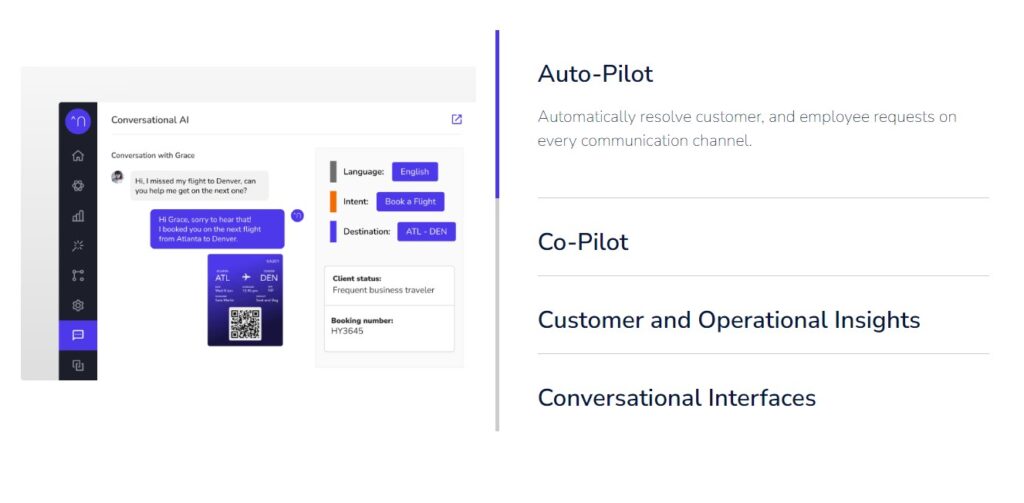
Netomi is an AI-powered chatbot platform that redefines customer service through its advanced automation and intelligent response capabilities. Designed to handle customer inquiries, provide support, and optimize interactions across multiple channels, Netomi offers a seamless and efficient way for businesses to engage with their customers.
Key Features:
- Natural Language Understanding: Netomi’s AI comprehends user intent, allowing it to respond contextually and accurately.
- Sentiment Analysis: It gauges user sentiment and adapts responses accordingly to ensure emotionally intelligent interactions.
- Omnichannel Support: Netomi integrates with various channels, maintaining consistency across platforms.
- Personalized Recommendations: AI-driven insights enable Netomi to suggest personalized solutions and offerings.
- Continuous Learning: The platform learns from interactions to improve accuracy and tailor future responses.
- Automation of Tasks: Netomi automates routine tasks, allowing human agents to focus on complex inquiries.
- Integration Capabilities: It easily integrates with existing systems, enhancing workflow efficiency.
Pros:
- Netomi’s AI capabilities lead to accurate and contextually relevant responses.
- Its omnichannel integration maintains consistent customer experiences.
- Continuous Improvement. AI-driven learning ensures responses become increasingly accurate over time.
- Efficient Task Handling
Cons:
- Implementation and customization may require technical expertise.
- Training the AI model to align with business specifics can be time-consuming.
- Highly specialized or intricate inquiries require human intervention.
2. Intercom
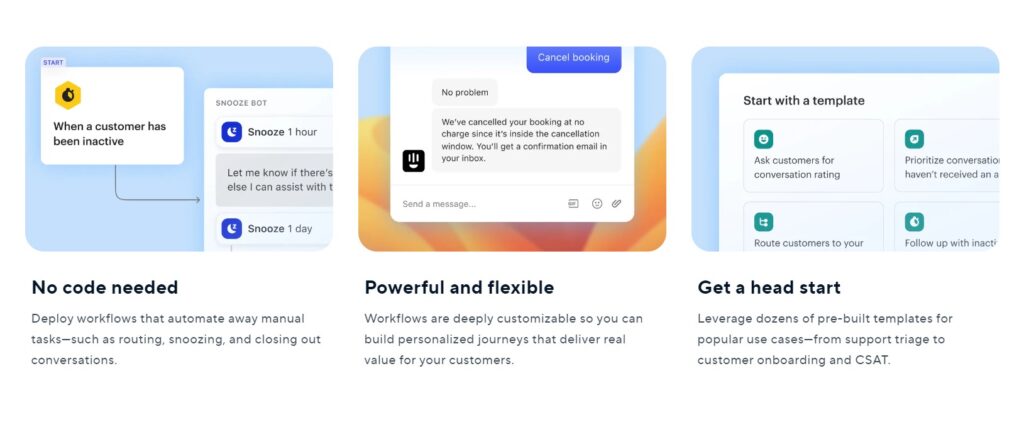
Intercom’s versatility in live chat, support, and marketing automation earns it a second mention.
Intercom excels in multiple aspects, seamlessly integrating with various communication channels to ensure real-time customer engagement. It goes beyond nurturing leads and optimizing conversions while offering personalized recommendations for enhanced sales. Intercom streamlines processes efficiently with support for diverse user preferences and automated workflows.
Key Features:
- Versatile live chat and support: This feature offers flexible real-time chat and assistance that can adapt to various customer needs.
- Multichannel integration: It enables the seamless connection and management of interactions across various communication channels, ensuring a unified customer experience.
- Lead nurturing and conversion: A strategy for building relationships with potential customers over time, guiding them toward becoming paying customers.
- Personalized recommendations: These are tailored suggestions or offers provided to customers based on their preferences and behavior, enhancing their individual experiences.
- Automating workflows: This process automates routine tasks and processes, improving efficiency and reducing manual labor.
- Multichannel support ensures consistent customer support and engagement across multiple communication channels, providing a cohesive experience.
- Advanced analytics: This refers to in-depth data analysis, offering businesses more profound insights into customer behavior, trends, and performance metrics, enabling better decision-making.
Pros:
- Multichannel reach for wider engagement.
- Real-time interactions for instant responses.
- Personalized sales recommendations.
- Diverse user channel support.
- Data-driven insights for optimization.
Cons:
- Potential complexity in implementing advanced features.
- The learning curve for effective utilization.
- Pricing may not suit all business sizes.
3. Drift
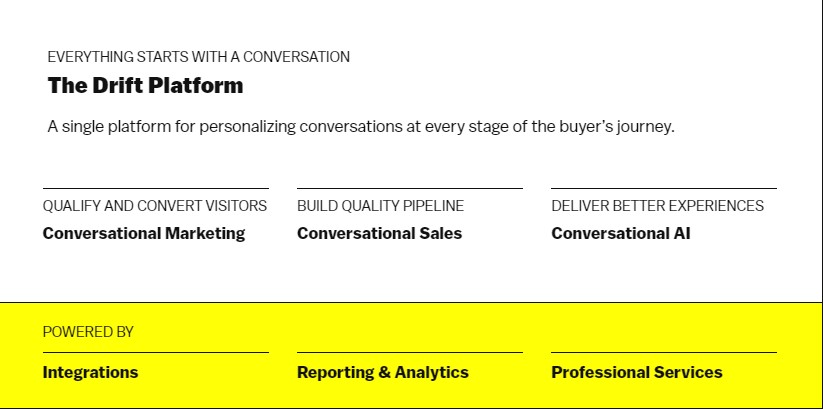
Drift’s dedication to conversational marketing aligns with the evolving customer preferences of today. Their AI-powered lead qualification enhances sales efficiency, seamlessly integrating with CRM systems to streamline sales workflows. Intelligent routing ensures users are connected with the most appropriate team members, nurturing real-time engagement and driving conversions.
Key Features:
- Automated lead qualification.
- Targeted messaging based on user behavior.
- Seamless handoff to human agents.
- Meeting scheduling within the chat.
- Detailed analytics for performance tracking.
- AI-driven sales playbooks.
- Integration with CRMs and marketing tools.
Pros:
- Improved lead conversion rates.
- Enhanced customer engagement.
- Real-time personalized interactions.
- Streamlined sales workflows.
- Integration with existing systems.
- Comprehensive analytics for optimization.
- Increased sales team efficiency.
- Ability to scale customer interactions.
Cons:
- Pricing might be prohibitive for small businesses.
- Initial setup and customization can be complex.
4. Salesforce Einstein
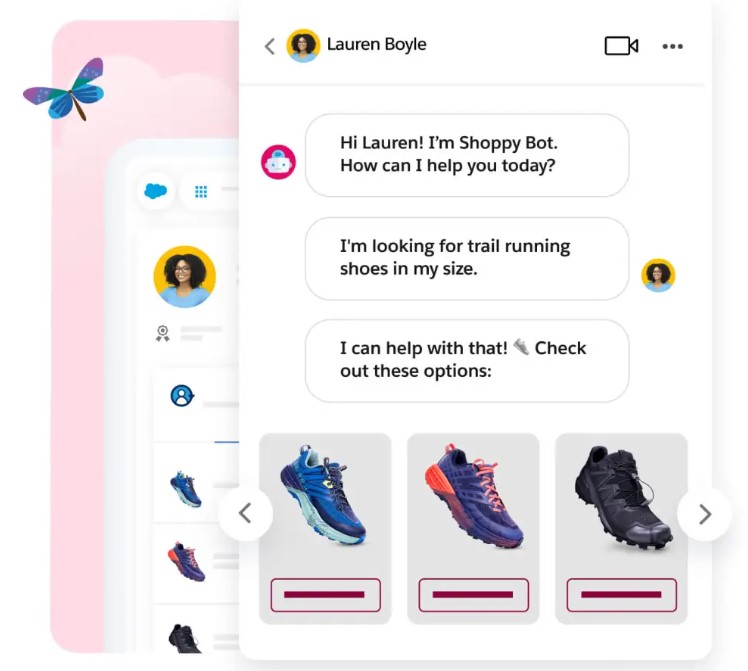
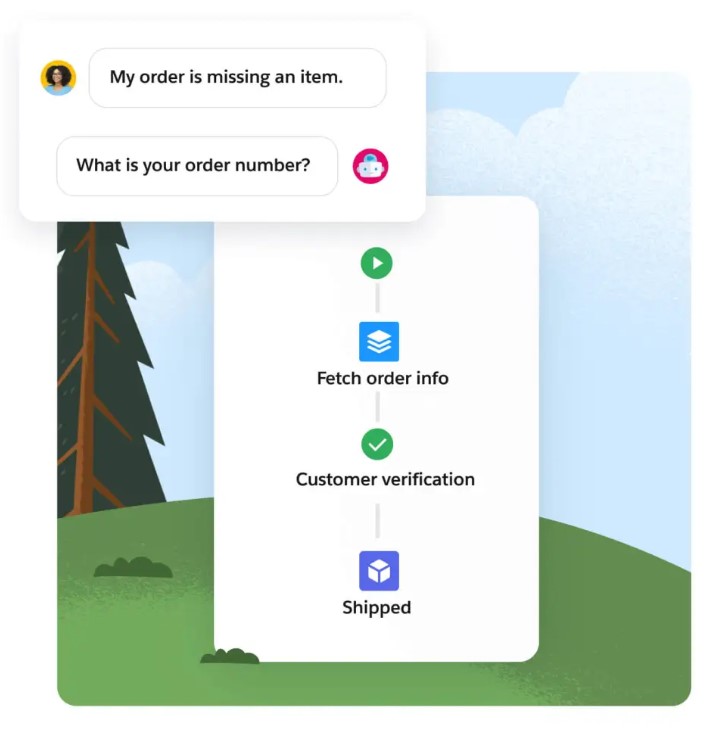
Salesforce Einstein brings AI to the forefront of customer relationship management, enhancing sales, marketing, and service. This platform offers efficient customer data management. With multichannel support, it ensures consistency in customer interactions, while AI-powered analytics inform data-backed decisions.
Key Features:
- Predictive lead scoring.
- Automated email campaigns.
- Intelligent recommendations for sales opportunities.
- Real-time insights and analytics.
- Automated case management in service.
- Multichannel support and engagement.
- Integration with Salesforce CRM.
Pros:
- Enhanced customer insights.
- Optimized sales processes.
- Data-driven decision-making.
- Improved lead conversion rates.
- Personalized customer interactions.
- Streamlined customer service.
- Integration with existing Salesforce tools.
- Real-time analytics for performance evaluation.
Cons:
- Requires familiarity with the Salesforce ecosystem.
- Potential complexity for smaller businesses.
5. WP-Chatbot

WP-Chatbot is a WordPress plugin that empowers websites with AI-driven chat functionality.
It seamlessly incorporates AI chatbot functionality into WordPress websites, offering an accessible solution for businesses on this platform. With instant customer support and engagement within the website, it demands minimal technical expertise for setup and operation. Proactively interacting with visitors helps retain them and reduce bounce rates, enhancing the overall user experience through real-time information and assistance.
Key Features:
- WordPress plugin integration.
- AI-driven customer interactions.
- Proactive engagement.
- Lead capture and qualification.
- Real-time assistance.
- Customization options.
- Integration with other WordPress tools.
- Visitor behavior analysis.
Pros:
- Seamless integration with WordPress.
- Instant customer engagement.
- Reduction in bounce rates.
- Minimal technical setup.
- Improved user experience.
- Increased lead capture.
- User-friendly interface.
- Brand-aligned customization.
Cons:
- Limited to WordPress-based websites.
- Less suitable for complex interactions.
6. Uniphore
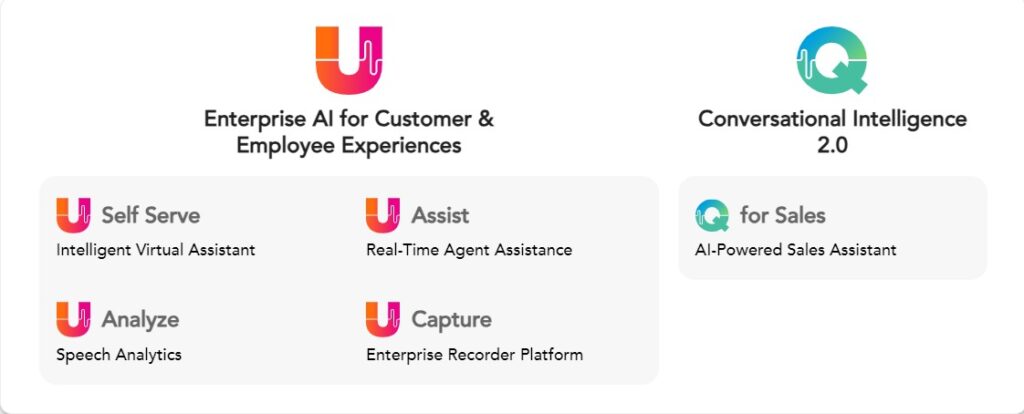
Uniphore distinguishes itself through its unique specialization in voice-based interactions. With real-time sentiment analysis, it effectively gauges customer emotions, and its multilingual capabilities cater to diverse user bases. Streamlining processes automates voice interactions and seamlessly integrates with CRM systems for efficient data flow, all while enhancing accuracy and efficiency through speech recognition.
Key Features:
- Voice analytics involves analyzing and analyzing voice-based data, such as customer interactions, to extract valuable insights and trends.
- Voice biometrics: This technology uses unique vocal characteristics to verify a person’s identity, enhancing security and personalization in voice-based interactions.
- Multilingual support enables interactions in multiple languages, catering to diverse user bases.
- Process automation automates routine tasks and workflows, saving time and resources while ensuring consistency and efficiency.
- Integration with CRMs ensures seamless data flow between different platforms for better customer management.
- Speech recognition: This technology converts spoken language into text or data, improving accuracy and efficiency in voice-based interactions.
Pros:
- In-depth voice insights.
- Improved security with biometrics.
- Real-time emotion analysis.
- Multilingual customer support.
- Streamlined processes.
- Integration with existing systems.
- Enhanced accuracy with speech recognition.
Cons:
- Voice interactions only suit some businesses.
- Complexity in implementing voice biometrics.
- Potential challenges with dialect understanding.
7. Zendesk Answer Bot
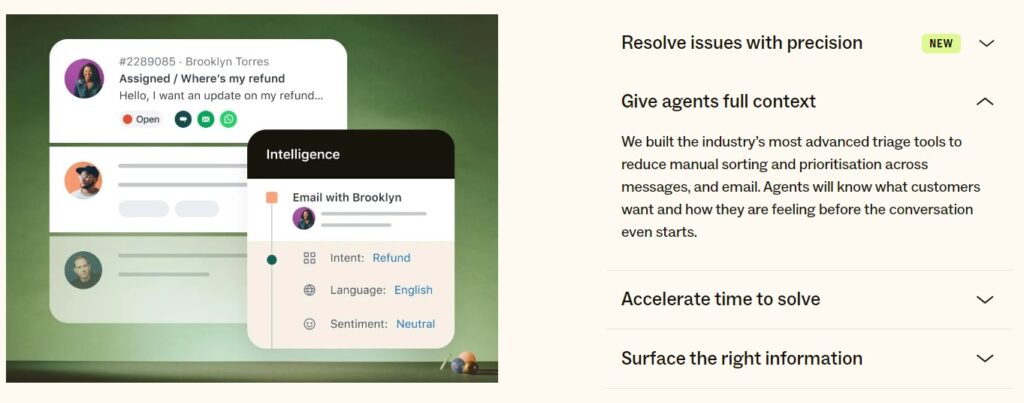
Zendesk Answer Bot is an AI assistant designed to automate customer support by suggesting relevant articles and solutions. Integrating this system with the Zendesk ecosystem further enhances the efficiency of support processes. With machine learning at its core, the system continuously refines its accuracy. It also provides valuable self-service options for users seeking quick answers, promoting proactive engagement and minimizing customer wait times. Moreover, the system efficiently handles routine inquiries, presenting a comprehensive solution for modern customer support needs.
Key Features:
- AI-powered article suggestions.
- Integration with Zendesk.
- Machine learning for accuracy.
- Proactive engagement.
- Self-service options.
- Rapid response times.
- Workflow automation.
Pros:
- Automated customer support.
- Reduced support agent workload.
- Increased customer satisfaction.
- Seamless integration with Zendesk.
- Continuous learning for improved accuracy.
- Empowerment of self-service options.
- Quick response times.
- Enhanced knowledge base utilization.
Cons:
- Limited to support use cases.
- May need to handle complex inquiries effectively.
- Potential challenges in recognizing nuanced queries.
8. Alexa for Business
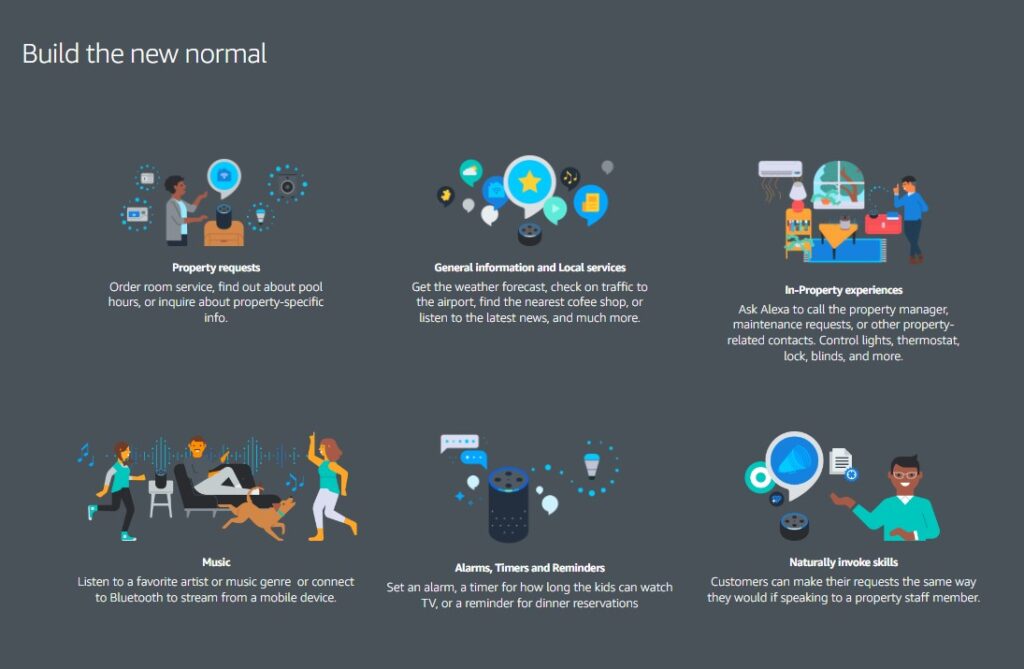
Alexa for Business leverages Amazon’s voice-powered assistant to enhance workplace efficiency and productivity. Integrating voice-driven AI into workplace processes represents an innovative advancement in modern office environments. Alexa’s integration with calendars and productivity tools streamlines meeting scheduling and management, while its ability to control smart office devices provides further convenience.
Key Features:
- Voice-controlled meetings.
- Integration with calendars.
- Device control and automation.
- Voice-driven productivity.
- Hands-free multitasking.
- Smart office device management.
Pros:
- Streamlined meeting management.
- Improved office automation.
- Hands-free productivity enhancements.
- Integration with existing tools.
- Enhanced office device control.
- Natural and intuitive interactions.
- Boosted multitasking capabilities.
Cons:
- Requires Amazon Echo devices.
- Limited to certain types of tasks.
- The initial setup may involve a learning curve.
9. SurveySparrow
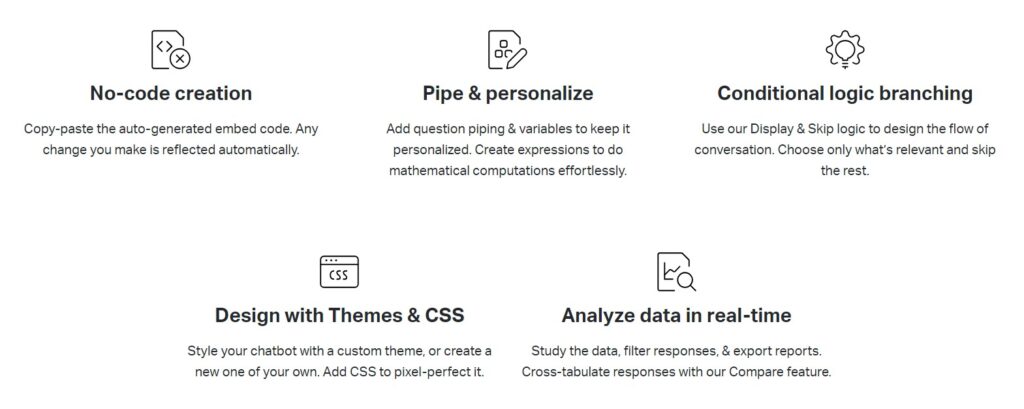
SurveySparrow is known for its conversational surveys that enhance user engagement and data collection. Conversational surveys offer a more engaging approach to user feedback collection, fostering a user-friendly interface that significantly boosts survey completion rates.
Key Features:
- Conversational survey design.
- User-friendly interface.
- AI-powered logic branching.
- Real-time responses.
- Multichannel distribution.
- Advanced reporting.
- Integration capabilities.
Pros:
- Engaging survey experiences.
- Higher completion rates.
- Real-time data collection.
- Relevant question logic.
- Multichannel reach.
- Data-driven insights.
- Seamless integration options.
Cons:
- Focused on survey use cases.
- It may not cover advanced survey needs.
- Specific integrations require technical knowledge.
10. LivePerson
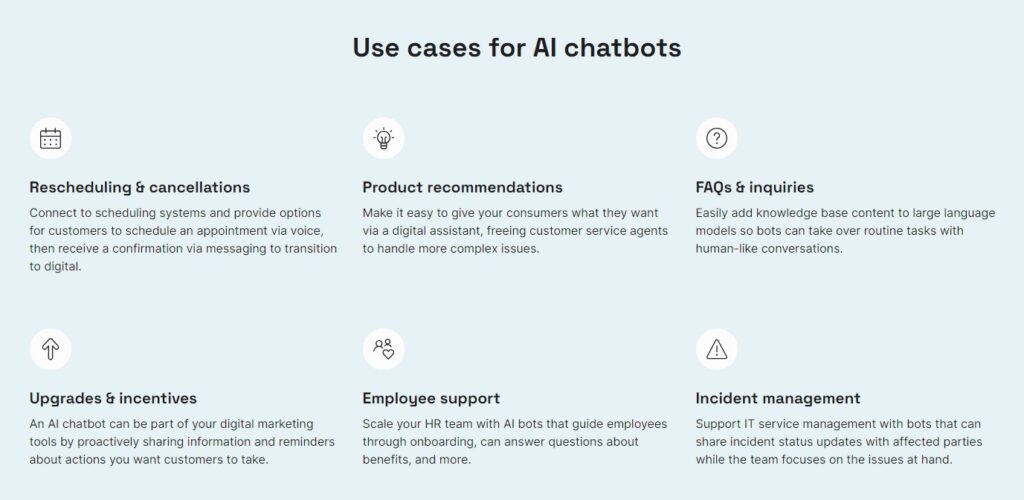
LivePerson is a conversational commerce platform that enables real-time interactions between businesses and customers. The focus on conversational commerce seamlessly aligns with contemporary e-commerce trends, offering real-time interactions for sales, support, and engagement.
Integration with messaging platforms expands the reach to potential customers, while the seamless transition from browsing to purchase optimizes the buying process. The incorporation of personalized recommendations elevates the overall customer experience, and proactive engagement strategies work to reduce cart abandonment rates.
Key Features:
- Conversational commerce platform.
- Real-time interactions.
- AI-powered suggestions.
- Multichannel support.
- Seamless transition to purchase.
- Personalized recommendations.
- Proactive engagement.
- Advanced analytics.
Pros:
- Enhanced e-commerce interactions.
- Real-time sales and support.
- Improved cross-selling and upselling.
- Wider reach with messaging platforms.
- Seamless purchase transition.
- Personalized customer experiences.
- Reduced cart abandonment.
- Data-driven optimization.
Cons:
- Primarily focused on e-commerce.
- It may not cover non-commerce use cases.
11. Genesys DX
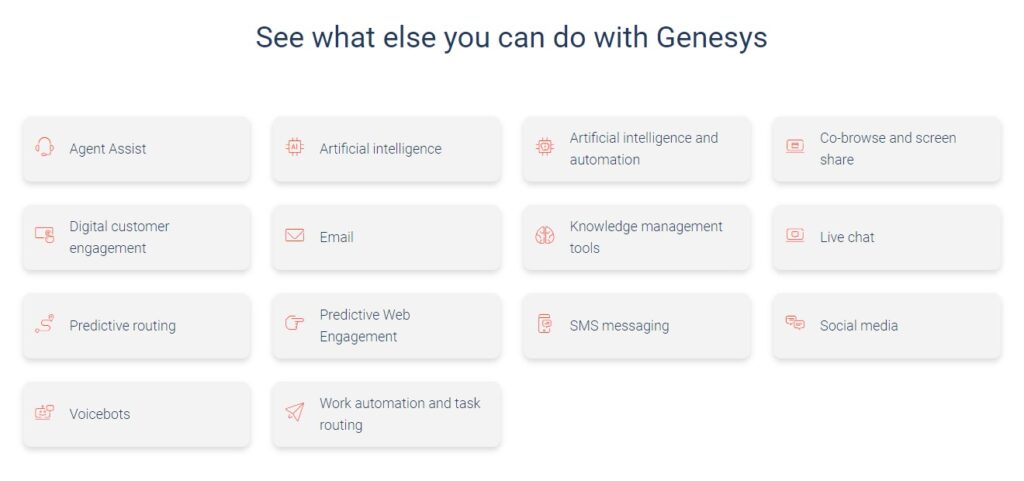
Genesys DX offers AI-powered solutions for customer engagement and contact center optimization. These solutions excel in providing personalized customer interactions, resulting in enhanced user experiences. Multichannel support ensures consistent and versatile customer service, and proactive engagement strategies work to engage customers effectively. Furthermore, integrating these solutions with the existing Genesys ecosystem adds a layer of compatibility and synergy for the customer service team, enhancing the overall performance of contact center operations.
Key Features:
- AI-powered customer engagement.
- Multichannel communication.
- Personalized interactions.
- Real-time analytics.
- Optimized routing.
- Proactive engagement.
- Integration with Genesys ecosystem.
- Agent assistance.
Pros:
- Comprehensive customer engagement.
- Multichannel reach.
- Personalization for improved experiences.
- Data-driven decision-making.
- Efficient routing for quick resolutions.
- Proactive engagement strategies.
- Integration with Genesys tools.
- Enhanced agent productivity.
Cons:
- It may require familiarity with the Genesys ecosystem.
- Potential complexity for smaller setups.
- The learning curve for advanced features.
12. ManyChat
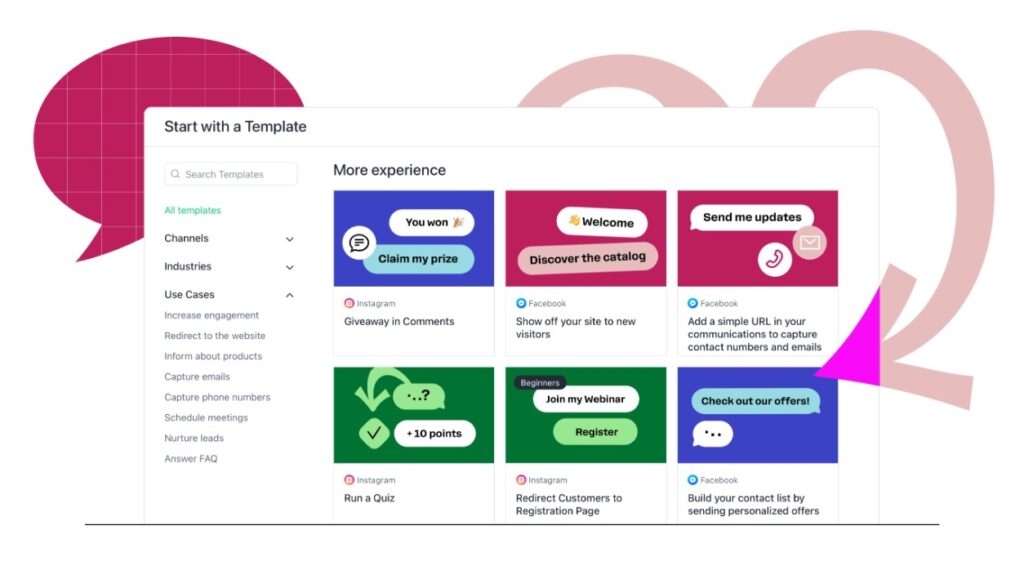
ManyChat specializes in chat marketing automation, allowing businesses to engage with customers on messaging platforms. The focus on chat marketing automation seamlessly aligns with the ever-evolving landscape of marketing strategies. Leveraging AI-powered automation, businesses can significantly enhance customer engagement on popular messaging apps.
The automation also covers crucial aspects like follow-ups and nurturing sequences, enhancing lead generation and qualification processes. Real-time interactions and responses further bolster customer interactions, ensuring swift and efficient engagement on their preferred communication channels and contributing to an elevated marketing experience.
Key Features:
- Chat marketing automation.
- AI-powered engagement.
- Personalized messaging.
- Multichannel integration.
- Automated follow-ups.
- Lead generation and qualification.
- Real-time interactions.
- User-friendly interface.
Pros:
- Advanced marketing automation.
- Enhanced engagement on messaging apps.
- Targeted campaigns and personalization.
- Wider reach with multiple platforms.
- Automated lead nurturing.
- Improved lead conversion.
- Real-time responses and interactions.
- Streamlined customer interactions.
Cons:
- Primarily suited for marketing use cases.
- It may not cover other business needs.
- Specific integrations require technical knowledge.
13. Kore AI
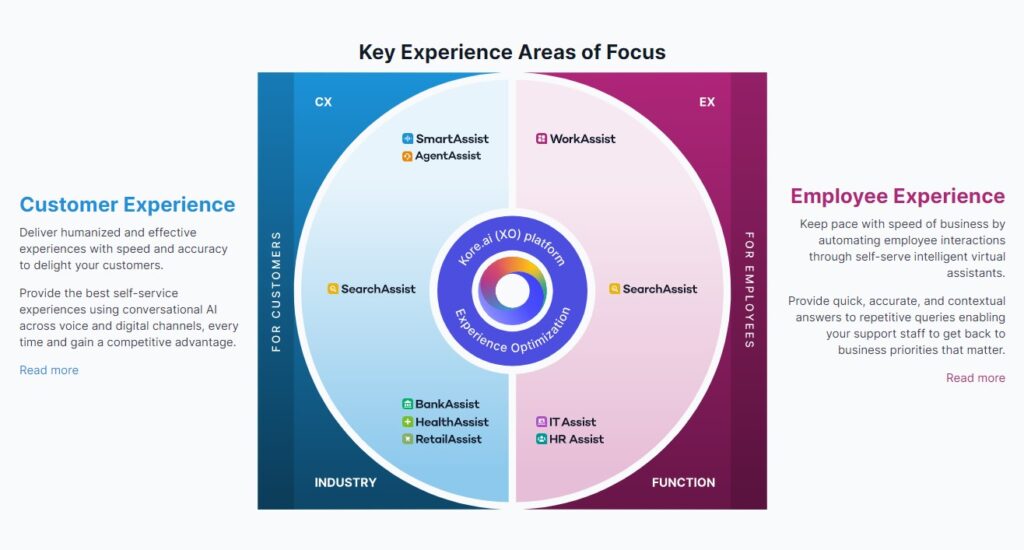
Kore AI focuses on enterprise-grade conversational AI solutions, empowering businesses with virtual assistants. They deploy AI-powered virtual assistants that streamline internal and external processes, making operations more efficient. With advanced natural language understanding, these solutions excel in handling intricate interactions.
Key Features:
- Enterprise-grade conversational AI.
- Virtual assistants for various tasks.
- Integration with enterprise systems.
- Multilingual capabilities.
- Task and workflow automation.
- Enhanced employee engagement.
Pros:
- Tailored solutions for complex business needs.
- Virtual assistants for diverse tasks.
- Accurate natural language understanding.
- Integration with enterprise systems.
- Global reach with multilingual support.
- Automation of routine tasks.
- Improved employee efficiency.
- Customization for unique business requirements.
Cons:
- Primarily targeted at larger enterprises.
- Potential complexity in customization.
14. Replika

Replika is an AI chatbot focusing on personal and meaningful conversations aimed at personal growth and support. This unique approach centers around personal growth and mental well-being, where an AI chatbot is a conversational companion for users.
With a strong emphasis on empathy and understanding user emotions, it fosters engaging and personalized conversations to improve mental health. User benefits from a tailored experience, reflecting individual needs and preferences, all powered by AI-driven support for emotional well-being. This approach represents a valuable resource for those seeking support and self-improvement in mental health.
Key Features:
- Personal growth-focused AI.
- Conversational companion.
- Emotion understanding and empathy.
- Mental health conversations.
- Anonymous interactions.
- Tailored user experiences.
- Real-time guidance and support.
- Emotional well-being assistance.
Pros:
- Unique focus on personal growth.
- Conversational companion for users.
- Emotionally understanding interactions.
- Improved mental well-being support.
- Anonymous and safe conversations.
- Individualized experiences.
- Real-time guidance and responses.
- Enhanced emotional support.
Cons:
- It is not intended for business or utility use.
- It may not cover broader AI chatbot functionalities.
15. Helpshift
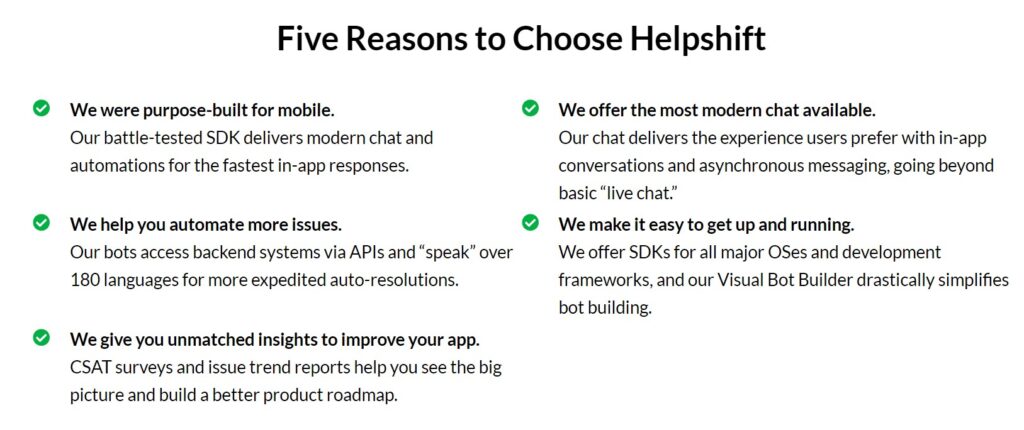
Helpshift is a versatile AI-powered chatbot tailored for customer support within the mobile app ecosystem. Helpshift stands out for its deep integration capabilities within mobile apps, offering a unique advantage for businesses aiming to provide instant and contextually relevant support to their app users. Its ability to handle complex queries and maintain conversational context makes it ideal for businesses seeking to elevate mobile app user experiences.
Key Features:
- In-App Messaging.
- Its AI-driven chatbot engages users with intelligent responses, addressing common inquiries and guiding them toward solutions.
- Helpshift offers support in multiple languages, catering to a diverse user base.
- It can automatically convert chat interactions into support tickets for efficient issue resolution.
- Businesses can tailor workflows to align with their unique support processes and preferences.
- Helpshift integrates with knowledge bases, ensuring consistent and accurate information delivery.
Pros:
- Helpshift seamlessly embeds within mobile apps, offering users in-app support without disruptions.
- Its AI-powered responses improve user experiences by providing quick and relevant assistance.
- Helpshift’s automated features enable businesses to handle many inquiries efficiently.
- Multilingual Capabilities.
- Automated ticket creation and management improve issue resolution times.
- Customizable workflows allow businesses to tailor the application to their specific support needs.
- Integration with knowledge bases ensures users receive accurate and up-to-date information.
Cons:
- Implementing and configuring the application may require a learning curve for new users.
- While adept at handling common queries, complex or specialized inquiries may require human intervention.
- Helpshift’s utility primarily applies to mobile app environments, limiting its use outside this scope.
These insights provide a solid foundation for selecting the chatbot solution that best aligns with your business needs and goals.
How AI Chatbots Enhance User Experiences and Streamline Operations
The integration of AI chatbots brings about transformative improvements in both user experiences and operational workflows:
- Enhanced User Engagement: AI chatbots engage users in dynamic, conversational interactions that simulate human interactions, fostering a more engaging and interactive environment.
- Efficient Customer Support: AI chatbots swiftly address common queries and concerns, allowing human agents to focus on more complex and high-value interactions.
- Seamless Navigation: AI chatbots guide users through websites, assisting with navigation and swiftly directing users to relevant sections or products.
- Reduced Friction: By providing immediate assistance, AI chatbots prevent user frustration resulting from delays or difficulties accessing information.
- Data-Driven Insights: AI chatbots generate valuable insights through interactions, aiding businesses in understanding user preferences, pain points, and behaviors.
- Workflow Streamlining: Beyond customer-facing interactions, AI chatbots can automate internal processes, such as appointment scheduling or data collection, optimizing operational efficiency.
- Personalized Recommendations: AI chatbots analyze user behavior and preferences to offer personalized product or content recommendations, increasing the chances of user engagement and conversions.
- Multi-Platform Accessibility: AI chatbots can seamlessly operate across various messaging platforms and websites, ensuring consistent user experiences regardless of the chosen communication channel.
- 24/7 Availability: AI chatbots are available round-the-clock, catering to users in different time zones and accommodating their schedules for increased accessibility.
- Language Diversity: AI chatbots support multiple languages, breaking language barriers and enabling businesses to engage with a global audience effectively.
- Cost Savings: By handling routine tasks and inquiries, AI chatbots reduce the workload on human agents, leading to cost savings and allowing companies to allocate resources more efficiently.
By enriching user experiences and streamlining operations, businesses stand to cultivate lasting relationships, fuel growth, and remain at the forefront of innovation.
How AI Chatbots Use Artificial Intelligence
A sophisticated blend of artificial intelligence technologies underpins AI chatbot functionality.
AI Technologies Powering Chatbots
- Natural Language Processing (NLP): At the core of AI chatbots lies NLP, a technology that enables machines to understand and interpret human language. NLP equips chatbots to comprehend user queries, nuances, and intents, ensuring conversations feel natural and intuitive.
- Machine Learning (ML): ML equips chatbots with the ability to learn from data and improve over time. By analyzing past interactions, ML algorithms enable chatbots to refine their responses, personalize recommendations, and adapt to user preferences.
- Deep Learning: A subset of ML, deep learning involves complex neural networks that mimic the human brain’s interconnected neurons. This technology empowers chatbots to handle intricate conversations, understand context, and generate more contextually relevant responses.
- Speech Recognition: For voice-enabled chatbots, speech recognition technology converts spoken words into text, allowing the chatbot to accurately process and respond to voice-based queries and commands.
The NLP, ML, and related technologies equip AI chatbots with the capability to deliver accurate and contextually relevant information and contribute to a seamless and engaging conversational experience.
Who Benefits from AI Chatbots?
AI chatbots have transcended their initial purpose and evolved into versatile tools catering to various industries and roles.
- Customers: AI chatbots enhance customer experiences by providing instant responses, personalized recommendations, and seamless interactions, catering to the growing demand for immediate assistance.
- Business Owners: Chatbots streamline operations, reduce costs, and improve efficiency, making them valuable assets for businesses aiming to optimize resource allocation.
- Marketing Professionals: Chatbots facilitate targeted marketing campaigns through personalized interactions, lead qualification, and data-driven insights.
- Sales Teams: AI chatbots contribute to lead generation, nurturing, and conversion, assisting sales teams in achieving higher conversion rates.
- Customer Support Teams: Chatbots assist customer support teams by handling routine inquiries, freeing up agents to focus on complex issues and exceptional customer experiences.
Conclusion
In a rapidly evolving digital landscape, the importance of embracing AI chatbots cannot be overstated. Businesses that integrate these intelligent tools stand to gain competitively.
As AI chatbots evolve, their potential to reshape industries, elevate customer interactions, and drive business growth remains unparalleled.
By integrating these technological wonders into their strategies, businesses pave the way for a future where engagement is seamless, efficient, and deeply personalized personalized.
Frequently Asked Questions (FAQ)
Q1. What exactly is an AI chatbot?
An AI chatbot is a computer program that uses artificial intelligence technologies, like natural language processing and machine learning, to engage in text or voice-based conversations with users. It aims to provide instant responses and simulate human-like interactions.
Q2. How do AI chatbots work?
AI chatbots work by processing user inputs, understanding the context and intent behind them, and generating appropriate responses. They use algorithms and AI technologies to learn from past interactions and improve over time.
Q3. What are the benefits of using AI chatbots for businesses?
AI chatbots offer numerous benefits, including cost savings through automation, 24/7 availability, personalized interactions, streamlined customer support, lead generation, and enhanced user engagement.
Q4. Are AI chatbots only for large businesses?
No, AI chatbots are adaptable and can benefit businesses of all sizes. They allow small businesses to offer seamless customer support and engage with customers effectively.
Q5. Can AI chatbots understand human emotions?
Advanced AI chatbots can employ natural language processing to understand and interpret human emotions, tones, and nuances in conversations. This allows them to provide empathetic and contextually relevant responses.
Q6. Can AI chatbots replace human customer support agents?
AI chatbots can handle routine inquiries and tasks, allowing human agents to focus on more complex issues. While they enhance customer support efficiency, human agents remain essential for complex and empathetic interactions.
Q7. How accurate are AI chatbot responses?
AI chatbots’ accuracy improves over time as they learn from interactions. They excel at handling frequently asked questions but may require human intervention for highly unique or intricate queries.
Q8. Do AI chatbots work on all platforms?
AI chatbots can be integrated into various platforms, including websites, messaging apps, and social media platforms. However, their functionality may vary based on the platform’s capabilities.
Q9. Are AI chatbots secure in handling sensitive data?
Many AI chatbots adhere to strict security protocols to protect user data. Choosing reputable chatbot providers and ensuring compliance with data protection regulations is essential.
Q10. Can AI chatbots be customized for specific industries?
AI chat software can be customized to cater to specific industries and business needs. They can be trained on industry-specific terminology and tailored to provide relevant information.
